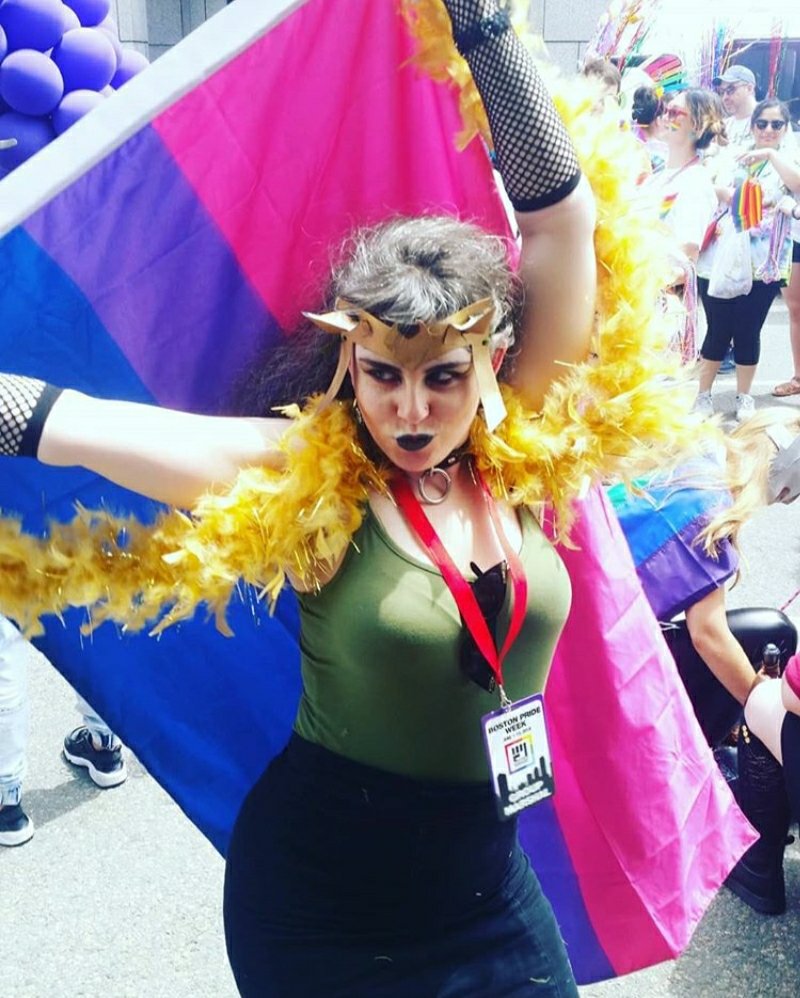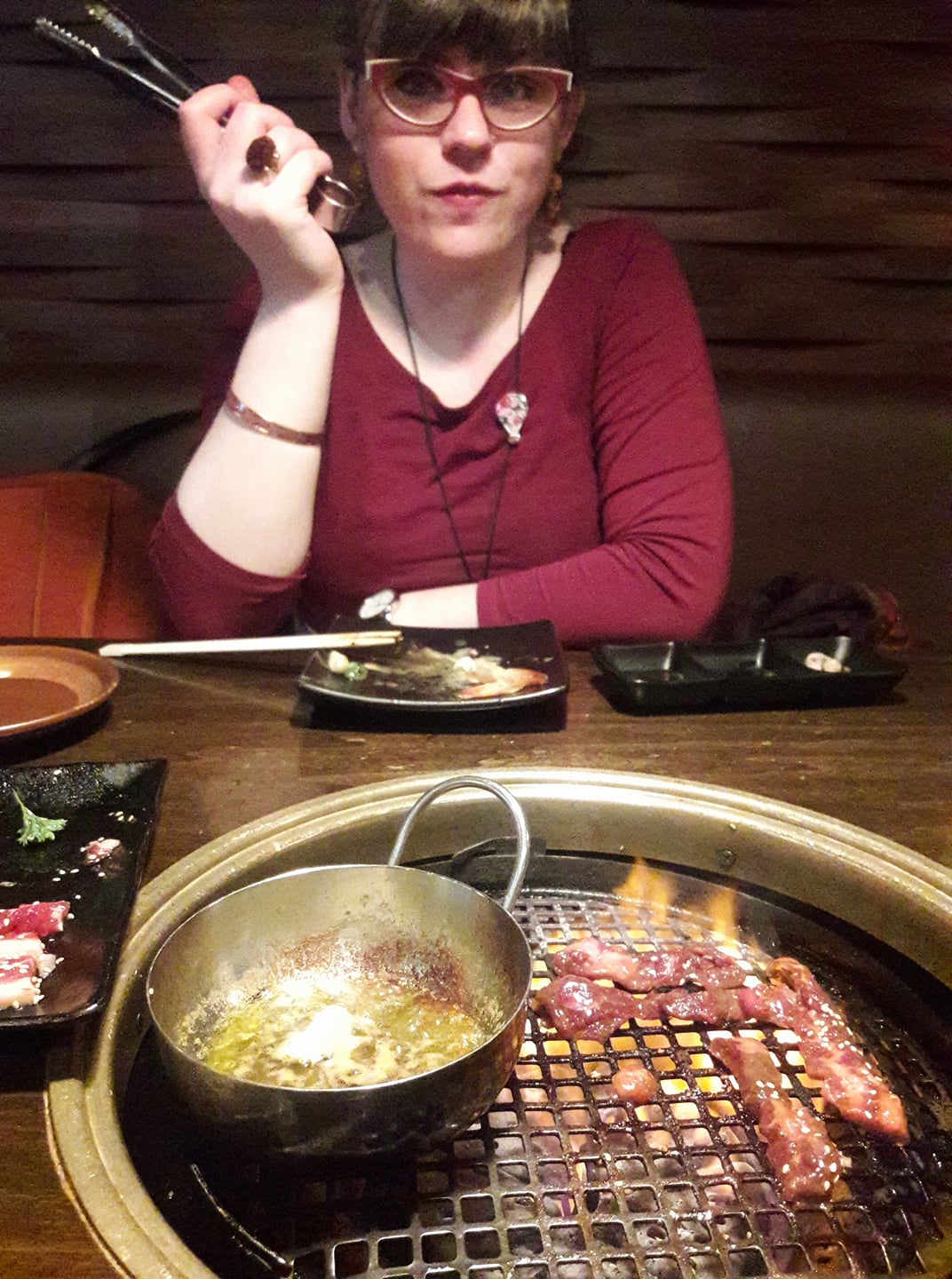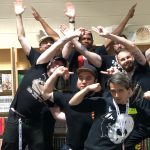Happy Pride! I spent yesterday dolled up as Loki, marching with various other Avengers as a part of Boston’s Pride Parade. It’s something we’ve been doing at Comicopia for the last decade now, though this is only my second time going, personally.
Marching in Pride is pretty tiring, but being there reminds me of why this kind of visibility is important for the queer community — of Boston, and of the world as a whole. I marched and screamed and smiled while hoisting the bisexual pride flag high, and I locked eyes with a small child wrapped in their very own bi pride flag. Another little one ran right out and gave me a hug, and countless people cheered as they saw me: visible and queer and there to celebrate myself and them.
But queerness isn’t visible everywhere, or at all times. It’s not allowed to be part of so much of mainstream culture, even now in 2018. In the comics world, however, it’s steadily on the rise. I have kind of accidentally read a lot of gay material this year; and while the content and quality vary greatly, that’s not something I could have said a scant five years ago.
I feel as though I can hardly scroll through my Twitter feed without someone bringing up My Lesbian Experience With Loneliness, and I’m glad of it! It’s sequel recently came out, the first part of My Solo Exchange Diary. And Seven Seas has also released The Bride Was A Boy, which I have already covered; soon, they will also have released Riyoko Ikeda’s Claudine, about a transman living in 19th century France.
The yuri market seems to be expanding as well, and though Seven Seas has often taken the lead in that genre, we’re seeing Viz Media throwing their hat in the ring with titles like After Hours and Sweet Blue Flowers. And they’re going to be publishing some BL too (or perhaps the term shonen ai would be more appropriate in this context), under their normal Viz moniker, not their SuBLime imprint: That Blue Sky Feeling, coming out in August.
Volume one of Gengoroh Tagame’s My Brother’s Husband came out last year, and we’re expecting its sequel in the early fall. Fantagraphics recently reprinted the Massive bara anthology, which is excellent for us because…honestly, we sell a ton of Tagame and bara in general! I know that’s probably not typical, I can’t completely fathom why we’re able to move it the way that we do.
I haven’t even gotten to talking about non-manga comics, with publishers like Boom Studios and Oni Press taking the lead in queer material, especially queer material for young audiences. And a lot of those gay young people books? It’s clear that they’ve been influenced by anime and manga.
So. What does this all mean? I would surmise that someone somewhere has realized that queer content is marketable. For a long time, that market seemed to be fujoshi scrambling for yaoi, but the tides are turning a little bit. A lot of those fujoshi have explored their own sexuality or identity and found themselves identifying as something other than straight or cisgender. They’ve been joined by fudanshi, perhaps. Or maybe the strange nature of animanga has made readers flexible to ideas outside of their norm.
I can’t say, of course, that that’s how things have progressed. But I can say that for me, the animanga community has always been very…well, gay. I had a conversation with someone about the local Massachusetts Independent Comics Expo (MICE) recently, and when I said I loved it because it felt like one big artist’s alley, he responded that it seemed much queerer than any artist’s alley at any con he had ever been to. And that’s when it hit me — the comic book conventions cater to a completely different crowd than the anime conventions. I mean, obviously, right? But not just in content; in age and economic standing and social status…in every way imaginable.
We’ve graduated from the yaoi paddles of my adolescence, thank God, but I can’t spit at Anime Boston without hitting a kid wearing a YAOI-emblazoned snapback. I sell out of My Lesbian Experience With Loneliness and I Hear the Sunspot on a regular basis at the store, and still sell them with lightning speed at shows. I see pronoun pins on shoppers almost as often as I see character goods.
And some enterprising person (or people), perhaps queer themselves, has discovered that there is a whole group of people out there whose media is under-serving them on a daily basis. And so they’re filling that niche. That sounds cynical, and clinical, I guess, but it’s really a wonderful thing.
The first Pride march was a riot; the current Pride parades have corporate sponsorship. The nature of achieving progress in our society, as it currently stands, seems to necessitate becoming a “commercial success,” so to speak. I don’t love the coupling of business and marketing with identity; I hate the fact that my Pride marshal badge both this year and last proudly proclaimed the name of a bank sponsor. I don’t trust corporations to do better just because they choose to align themselves with a hot topic like feminism or gay rights or whatever.
But…I feel differently about the world of publishing. It’s naiive, perhaps, and maybe it’s because I know people who work in publishing that I’m able to hold on to this hope. Comics as an industry is a mess, but I want to see myself and my queer siblings as the heroes of our own stories. I want to trust that these license agreements are coming not solely from a sales point of view, but from a desire to help bolster visibility.
And while the queer stories themselves are a boon, I want to see a growing trend of stories by queer creators. I think that’s the most important way to show support — to give a voice to those who for so long have been voiceless. To allow those creators to feel safe, and listened to, and proud.

Anime Boston
Anime Boston, My Birthday, and Live Chats — Oh My!
The last couple weeks have been incredibly hectic, but for all good reasons! As many of you know, Anime Boston was last weekend. The store I work for, Comicopia, has a large booth at the show, and part of my responsibilities is helping with ordering and organizing what we bring, who our volunteers are, and how things get displayed. The month leading up to AB is honestly a lot more work than being at the show and selling the books! That’s the fun part — getting to interact with customers, helping people find what they’re looking for, figuring out new ways to showcase books on the fly. And we have a really great host of volunteers who help make the experience extra fun.
- Mark and me, spiraling into horror.
- We had a ton of lady volunteers, too, but we noticed that the guys were all wearing black on Sunday and just had to take advantage of the photo op!
As is often the case, my birthday was immediately after Anime Boston — this past Wednesday, in fact. I spent the day…well, going to work and unpacking manga, honestly, haha. It wasn’t so bad, and my husband and I went out for Japanese barbecue afterwards which was great.

And now, all the manga is unpacked and counted, I’ve figured out what needs reordering, and we can get back to business as usual at work for a little while! I’ve been pleased to note that some more obscure titles have been selling lately in the store, and I hope that we can continue to fill that niche for customers!
Bit of an announcement before I pop off: at 4pm today I’m taking part in the third installment of The Black Manga Critic’s “Women Talk About Anime & Manga” series! We’re going to be discussing Nagata Kabi’s My Lesbian Experience With Loneliness, published in English by Seven Seas Entertainment. Joining us on the panel tonight will be the manga’s translator, Jocelyne Allen, whose insights I’m really looking forward to hearing! I hope some of you will have a chance to watch that, whether it be live as it airs or after the fact.
I promise that since life has settled down a bit more, I’ll actually get to posting some manga-specific content, not just “day in the life of a Manga Maven” stuff, haha. I’m especially excited about the new GeGeGe no Kitaro anime that’s airing right now, so I’m sure I won’t be able to resist sounding off on that!
Keep it real, kids!

